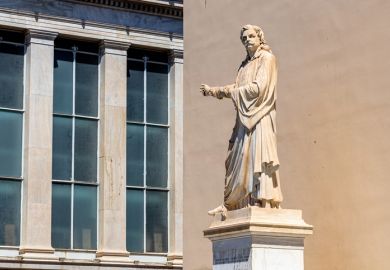The current fees regime has operated more like a cartel, without any real correlation between cost and quality
It’s a telling, if depressing, insight into just how febrile the clamour around the pay of UK university leaders has become that the old jibes are back. Specimen: What’s the difference between a university vice-chancellor and a supermarket trolley? Answer: You can get more food and drink into a vice-chancellor.
I’ve worked with several vice-chancellors, and all have been energetic, dedicated, professional people. I have no particular view about what a fair wage for them should be, except to say that it can’t just be about the external competition; it also needs to take seriously the impact on internal morale, esteem and collegiality right across an institution. That may be harder to measure, but it’s priceless.
But when it comes to the financial health of the sector, the real problem is not the pay of university leaders. Nor is it high tuition fees or escalating levels of graduate debt. These are symptoms.
The real problem is deeper: it is the failure to deliver the underlying purpose of the reforms proposed by Lord Browne’s 2010 review, which gave birth to the current fees regime. This was to bring sustainable funding and energising competition to a growing and diversifying higher education sector. Instead, the system has operated more like a cartel, without any real correlation between cost and quality.
There’s plenty of blame to go around, and the lion’s share lies with ministers’ desire to have things all ways up. By both allowing fees to rise and imposing a hard ceiling, they in effect invited universities to render stillborn the market they claimed to be trying to create. Much to their apparent surprise and discomfiture, just about everyone went for the £9,000 limit.
At the University of Oxford, where I was director of public affairs, I favoured a lower ticket price of about £8,000, principally because I thought it could help in the unending battle to encourage bright students to view Oxford as affordable and accessible. If the new regime was going to work, some market stimulus was also needed, and where better than Oxford? Perhaps predictably, the government liked the idea; most of my colleagues did not.
Some institutions have done very nicely out of the arrangements, which more than cover their related costs. Whether the surplus should be regarded as gravy that vice-chancellors are spilling down their gowns is another matter.
More worrying is the financial risk-taking the current set-up has allowed and, arguably, encouraged. Largely on the expectation that the fees will continue to roll in, some institutions have indulged in speculative infrastructure projects that they may live to regret – especially if Brexit and visa rules stem the student flow. The flawed implementation of the funding model has also greatly exacerbated the neuralgic issue of student debt. With universities charging maximum fees, the cost to the public purse of up-front student loans has skyrocketed. Speculation about how much of the total amount (increasing by nearly £15 billion a year) will ever be recouped is just that. But the rising interest rates that graduates face on their loans are real enough.
So what’s to be done? Belated government attempts to kick-start competition are less than compelling. Neither trying to peg future fee rises to unconvincing metrics about teaching quality nor opening the sector to more private providers looks like a major game-changer.
Calls for complete abolition of the current set-up have a simplistic appeal. But there’s the small matter of what would take its place. Participation in higher education has increased, and that’s positive. The principle of students making affordable contributions post-graduation is a good and now a necessary one. The idea that it can all be done out of general taxation does not withstand serious scrutiny if we want quality as well as quantity.
No, what we need is more of a market in higher education, not less. That means finally giving effect to the original intent of the reforms. Crucially, it requires less obsession with sticker price and more scrutiny of real value. This should be the regulatory focus.
Institutions should have latitude in setting the price of a course, provided certain conditions are clearly met. These include a transparent estimate of the cost of delivery, an independent assessment of the likely public benefit (to individuals and society), and a guarantee that finance is not a barrier to entry.
The state’s commitment (and the future basis of the student loan book) should be a repayable baseline contribution per undergraduate. This could be incentivised where the nation needed more engineers, say, or philosophers, or linguists. Institutions would take the lead in developing affordable student finance to guarantee needs-blind access to more expensive courses.
Yes, it would take a change of mindset and approach. But whatever the rights and wrongs of vice-chancellors’ pay, we shouldn’t go on pretending to be doing everything we can to provide a responsive, diverse higher education system that favours the student, energises the institution and benefits us all. Too often, that just isn’t true.
Jeremy Harris is founder of The Ruelle Consultancy and is a former director of public affairs at the University of Oxford. jeremy.harris@theruelleconsultancy.com

If we expect vice-chancellors to be, say, one in 1,000 in the talent distribution within the population, then we need to raise their current pay
What is the right level of pay for those who lead UK universities? Lord Adonis – who sparked this summer’s debate about executive pay – suggests that their salaries (typically in the mid-£200,000s to low £300,000s) should be halved, and Jo Johnson, the universities minister, announced last week that any salaries over £150,000 will have to be justified publicly. I have not heard a logical argument to support Adonis’ strange claim, but nor have I seen a clear analysis that justifies current rates of remuneration.
So how do we determine what vice-chancellors should be paid? Let’s attempt to leave emotion aside. The answer is: it depends from where in the underlying talent distribution we want to draw them. Do we want superb people at the top of universities? Or just very good people? Or even just reasonable ones?
Here is the background. In the UK, the top 1 per cent of earners earn a salary of about £170,000 or above. That sum is what we should pay if we expect vice-chancellors to be one in 100 in terms of talent. In my own view (and others may disagree), that number is not a sensible bar to set. One in 100 people are not born with the brains and extraordinary energy required to be a vice-chancellor.
Therefore, consider a higher bar. If you are in the top 0.5 per cent of UK earners, you are paid slightly less than £300,000 a year and above. If you are on the edge of the top 0.1 per cent, you earn roughly £600,000.
Society has to choose. If we expect vice-chancellors to be, say, one in 1,000 in the talent distribution within the population, then we need to raise their current pay. If we think it is OK to have one-in-100 kinds of individuals running universities, we should reduce pay to about £170,000. And so on.
You might object and say that surely universities do not compete with banks, say, or FTSE 100 companies for their leaders? Wrong. In the long run, the universities are indeed competing with such employers for their leaders (and for their other staff). I had to make a choice – I remember the exact day – between a bank job in London and a PhD studentship. And this does not apply merely to those with economics degrees. Banks are full of former undergraduates in history, Classics and biology, to name but three. Everywhere is.
In setting vice-chancellors’ pay, it is time for the nation, and especially politicians, to grow up. Commentators, perhaps understandably, are obsessed with the short term. That is not appropriate if we are trying to calculate in a mature way how university leaders should be remunerated. Rates of pay in a free society are determined by underlying long-run forces. Economics textbooks point out that every sector competes for labour with every other one. Workers pursue careers that offer good rewards, and they spread themselves into whatever sector and job looks attractive. Talent votes with its feet.
There are some caveats to note, though. First, it would be fair to say that some sectors offer non-pecuniary benefits. International aid charities pay less than most sectors because employees there feel good about themselves. University professors have more freedom than some others. Doctors like saving lives. However, these cases are fairly few in number. They do not change the main argument about the talent distribution. Anyone who runs a UK university could, with a different career track, earn a high salary doing lots of other things. I would not want to be vice-chancellor: it is too difficult and the rewards are not high enough.
Second, people vary in their preferences. A few individuals will do certain jobs for a small salary, but, when designing the pay of a group or occupation, we cannot rely on the outliers.
So ought our institutions of higher education to be headed by extraordinarily talented individuals, fairly talented ones, moderately talented ones, or so-so ones? The choice is society’s to make but, personally, one in 1,000 sounds right to me.
Andrew Oswald is professor of economics and behavioural science at the University of Warwick.

By embracing this disgusting inequality in pay between vice-chancellors and junior academics, our universities have disgraced themselves
Something deep, tormented and irrevocable is happening in the slow, submarine tides of British popular sentiment.
Despite decades of provocation, insolence and neglect on the part of the country’s ruling class, that motionless body, the people, is rousing in rage and resentment against the ways in which income and wealth are so hatefully and inequitably distributed: a distribution highlighted in particular by the stories of the neglected, impoverished victims of the Grenfell Tower disaster.
Universities known for championing solid virtues of human reason and progress have sadly embraced this radical inequality. Wretched wage slaves on zero-hours contracts are often forced to juggle two or three jobs, unaffordable rent and sometimes care of small children. This is no accident. As Stefan Collini has observed, the government has, since 2010, done all it can to force universities to mimic the failures of the British economy and abandon their own rather striking success as institutions of learning whose key products – original science, political criticism, practical medicine, personal solicitude, humane culture, moral precepts – are admired across the world.
Details of this income inequality in higher education are now red and inflamed by the publicity around vice-chancellors’ pay, thanks to Lord Adonis’ spiky interventions this summer. Times Higher Education has more than done its bit for truth and tactlessness by publishing a list of the salaries of every vice-chancellor in the land over the years, but this time everyone has noticed its results. Thanks to Adonis’ spotlight, it is now clear that higher education pay has gone morally and politically awry. Many more critics are now prowling the columns of THE’s annual pay survey in a spirit of malice, noting double-figure rises for vice-chancellors already earning several hundred thousand pounds while the poor junior academics have not seen a pay rise higher than 2 per cent for years.
By embracing this disgusting inequality, our universities have disgraced themselves. A country’s scales of pay are, at their simplest, no less than a picture of its valuation of its people’s contributions to the common good. Pay dramatises ethics. It tells us what we are worth to one another not as crude cash but relatively – relative to such ancient honorifics as mutual dependence (nurses), courage (firefighters) or historical continuity (teachers). What does the pay structure of higher education reveal about its own morality?
When a democracy hits a crisis like the present one around pay, it is supposed to debate with itself reasonably and equitably in order to determine a response that will command assent. The same must happen for higher education. The full authority of all vice-chancellors must be deployed to appoint a commission whose duty would be to review and revise the entire financial structure of higher education. Subsequently, it should resolve to make public every one of the details about executive pay that are currently concealed and undiscussed.
Vice-chancellors – as universities minister Jo Johnson has hinted – should surely be paid no more than the prime minister, at around £150,000. World-famous scholars should, at most, receive £120,000. Zero-hours contracts should be abolished and all junior staff, as was once the practice, offered terms for the award of tenure.
High pay, together with high fees, is only the worst symptom of a general, genteel chaos brought about by marketisation, league tables and impact measurement. But, whipped into disciplined stupefaction by their tyrannical managers, academics are bad at collective action. The only group small enough in number and large enough in power to change the situation is the vice-chancelloriat itself. These leaders could authorise the making of a New Deal, constructed by their best, most public-spirited staff.
This new deal would appoint Adonis as its chair, restore free higher education for the sake of the future and devise a just and rational salary scale that would pay the bosses less extravagantly while providing a more optimistic career horizon to its underpaid part‑time army.
But turkeys would never vote for Christmas, you say? Are you calling the vice-chancellor a turkey?
Fred Inglis is honorary professor of cultural history at the University of Warwick.
POSTSCRIPT:
Print headline: Because they’re worth it?
Register to continue
Why register?
- Registration is free and only takes a moment
- Once registered, you can read 3 articles a month
- Sign up for our newsletter
Subscribe
Or subscribe for unlimited access to:
- Unlimited access to news, views, insights & reviews
- Digital editions
- Digital access to THE’s university and college rankings analysis
Already registered or a current subscriber?




